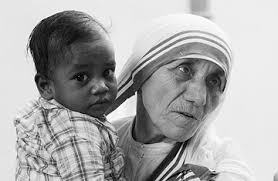 |
| Well this is certainly a new sight... |
As autumn rapidly approaches, we find ourselves rushing towards our quadrennial (once every 4 years) national ritual of vehemently hating at least 50% of the population of the country, based almost entirely on whether they are red or blue, elephant or donkey, conservative or liberal, and so on and so forth. Neighbor hating upon neighbor, Conservative older generations against liberal younger generations (or vice versa), everyone's barbecues and picnics ruined by squabbles until November blows over, all of which done with star-spangled hearts. Now, far be it from me to interfere with our national tradition, but I have noticed that when we draw our political battle lines, we tend to draw them in other aspects of our lives, or at least we tend to emphasize them more... emphatically (yes, its a redundant word... just work with me here, I'm no English major). Now, being a (mediocre) practitioner of Catholicism, I tend to ignore the battle lines drawn in realms like psychology and humanities and theatre (are there even polarizing debates in the realm of theatre?), mostly because I tend to be indifferent/ ignorant towards them. However, whenever I find there to be these lines drawn in Holy Mother Church, I think its worth mentioning, perhaps even worth and outcry of sorts.
Now, before you scratch your head wondering why this has anything to do with STARR, or get angry because you've assumed my stance on either side of this fight (which, in this post, I have not), I ask you kindly to read on...
Now, politics are split between big government and little government (somewhat), and psychology divided between nurture vs. nature (or so I've been told), and theatre between... whatever it is that thespians debate about. In Catholicism, the predominant polarizing debate typically lies here: Social Justice vs. Traditional Values. Unfortunately, it was never supposed to be a debate at all.
Let's set the stage, using a painfully rushed and stereotypical simplification of each side On the so-called "left", you have the social justice Catholic. These Catholics tend to place their emphasis on the issues of... you guessed it: social justice. They wish to greatly emphasize the need for Catholics to serve the poor, to alleviate suffering, to resist greed and elitism and what not. They aim to be accepting, inviting, and welcoming, and often find themselves at odds with some of the Church's more controversial teachings. On the side deemed "right", you find the traditional values Catholic. There is (stereo)typically an odor of incense surrounding these types, as their attention goes to liturgy, to moral teachings, and to near fanatical devotion to the Pope. They have a love and affinity for the rich tradition of Catholicism, their kids are named after no less than 19 saints, and all their favorite hymns are in Latin (some of them even possibly being in Koine Greek.) Where the left tends to be in disagreement on the controversial issues, the right is in absolute agreement with them, so much to the extent that these issues seem to dominate their focus and fill them with a horrible distaste for the current worldview. They tend to dislike the other, with the left accusing the right of being unsympathetic, rejecting Christ's loving and welcoming nature, while the right accuses the left of being unfounded, rejecting Christ's foundation in the truth for the sake of relevancy, popularity, and fair-play. So here's our debate. Left vs. Right, loving acceptance vs firm truths, Social Justice vs. Traditional Values. Its present, its widespread, and most of all, its really really really boring.
Now I'm no scholar of Sacred Scripture, I'm merely a humble commentator with little to know qualification to be commentating, but I do know this: there was never meant to be a division in the Body of Christ. We were never meant to be divided, to be split, to be politicized. The conflict is a festering wound on the Body of Christ, a reminder that, though the King be perfect, the Kingdom is made up of ridiculously imperfect humans. The main issue behind the debate is the illusion of division, brought on by the assumption that the Church is only as big as we can envision it. Thus, when we envision Church in the streets and the slums, we wonder how any Catholic could dwell in gilded, ornate, lofty cathedrals, and we quickly conclude that they must be wrong and we must be right. Or, when we see the great beauty and tradition of the Church's timeless and enduring tradition of faith and morals, we wonder how anyone could find themselves affirming those people living contrary to that tradition and concluded that they must be wrong and we must be right. In truth, both are wrong and both are right, entirely because both have envisioned a Church that is too small.
Catholicism is not a religion of either one vision or the other vision. It is a Church of both/and. We do not all choose between lives of comfort and austerity, we are a religion in which both desert hermits and kings are saints. We find people like St. Thomas More, a man well-off and influential who, when pressed, stood firm in his faith and paid for it with his life, yet we also find our dear St. Francis, who gave up everything to serve the poor and downtrodden. These men are together in the Communion of Saints, not divided, but in full understanding of their roles in the Body of Christ.


Christianity is not a matter of either serving the poor or standing firm in the teachings of the Church. Christianity is a matter of as Christ put in his own words, coming to "Love one another as I have loved you." (John 15:12) It requires us to know how Christ loved us and to love each other in such a way. Christianity is the inseparable bond of unstoppable Love and immovable Truth. Our mission is to accept everyone in the truth, and we cannot sacrifice either for the advancement of the other. “Religion that God our Father accepts as pure and faultless is this: to look after orphans and widows in their distress and to keep oneself from being polluted by the world” (James 1:27).
In the midst of the political wars, it is important to avoid the temptation to politicize Christianity. We are not about policies or platforms, we are about Jesus Christ, the Word made Flesh. The whole world, in all time and space is looking at us, silently asking us to prove all these things we claim, that God became Man, that Death is not the end, that Life can be eternal, and that the most fundamental truth behind everything is that we really are loved infinitely and eternally. We are given the mission to let the whole world know that Jesus Christ lives, and we have no way of doing so except serving the unservable, believing the unbelievable, hoping in the hopeless, and loving the unlovable. We're called to be Christ to the people.
STARR will only succeed to the extent that it seeks this goal. Marian will only succeed to the extent that it seeks this goal. You, my brother/sister in Jesus Christ, will only succeed to the extent that you achieve this goal. In ordinary things and extraordinary things, let the world know Jesus Christ. In great speeches and quiet words, speak of a God who loves unconditionally. In great outreaches of relief and gentle touches, heal the wounded in His Name. Everything you do, deeds great and deeds small, whether it be in lofty towers or the slums of the streets, let the whole world see Jesus Christ, alive in you.
 |
You can never have enough pictures of Mother Teresa, her face
shining with a love that this world is so desperately needing. |


